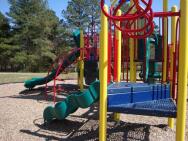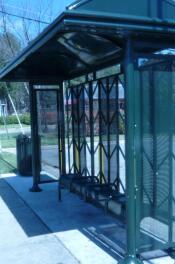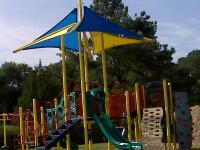Connecting Communities for Active Lives: Transit and Faith-Based Movements

Big steps have been taken by several groups in Wake County to build connections, improve resources and encourage active lifestyles. In 2007, the Triangle Transit Authority and the Gethsemane SDA Church both received three-year grants from the John Rex Endowment to tackle separate projects to remove barriers in communities where activities are inhibited by lack of access and safety concerns. Through collaboration, they addressed key missing links and created connections for active living.
Triangle Transit Takes Action
 Logical bus routes and campaigns to encourage mass transit can only go so far when people come face-to-face with real obstacles in their efforts to get moving. Try crossing multiple lanes of rush hour traffic with no pedestrian crosswalks just to get to your bus stop. Imagine waiting for the bus in a torrential downpour on your way to work. That’s exactly what Triangle Transit Authority did. They took the time to get off the bus and evaluate services from a customer’s point of view.
Logical bus routes and campaigns to encourage mass transit can only go so far when people come face-to-face with real obstacles in their efforts to get moving. Try crossing multiple lanes of rush hour traffic with no pedestrian crosswalks just to get to your bus stop. Imagine waiting for the bus in a torrential downpour on your way to work. That’s exactly what Triangle Transit Authority did. They took the time to get off the bus and evaluate services from a customer’s point of view.Triangle Transit Authority identified a serious need for improved bus stops, but there are hundreds of bus stops in Raleigh alone. With the desire to get the most bang for the buck in regards to community impact, they partnered with the City of Raleigh and the Capital Area Metropolitan Planning Organization to develop a new approach to prioritizing bus stop improvements.
Using Geographic Information Systems (GIS) mapping technology, Triangle Transit Authority worked with partners to overlap economic, health, ridership and community asset data to identify communities where bus stop improvements would make a big difference for the mobility of nearby residents.
The need for bus stop improvements was identified in targeted areas, including Reed Street in Cary and Proctor Street, Oakwood Avenue and New Bern Avenue in Raleigh. Plans included amenities such as shelters, bike racks, and trash receptacles. However, Triangle Transit Authority focused on thinking beyond the more visible and obvious improvements and worked with partners to assess pedestrian safety and identify hazards.
As the team entered the design stage, some stops posed more challenges than others. By assessing points of access for each individual stop, many safety concerns surfaced – shedding more light on hurdles and inhibitions of current and potential bus passengers.
The transit team also worked with communities to address easement issues and visual preferences for new shelters. The Southgate Community Outreach Association was engaged to ensure that selected materials would appeal to the community and to address concerns about the possibility of increased graffiti and crime.
One bus stop on New Bern Avenue in Raleigh presented unique needs for a large population. Along a busy thoroughfare which connects the downtown business district to the city beltline and several neighborhoods, the bus stop is also located across the street from WakeMed, the area’s closest hospital and one of Wake County’s largest employers.
Faced with the need to add a pedestrian path, crosswalk and synchronized traffic signals, Triangle Transit Authority tackled the New Bern Avenue bus stop project with the first private-public partnership to improve transit facilities in their service area. The City of Raleigh provided design and construction documents, and construction costs were covered by WakeMed and Triangle Transit Authority. Additionally, the NC Department of Transportation completed important traffic signal work to improve pedestrian safety.
Nearby in the Oakwood community, improvements at a bus stop included a shelter, trash receptacle and bike racks. Using an individualized marketing plan, a minimum of 400 households in the Oakwood area received educational materials about the improvements and transit services.
Triangle Transit Authority kept a forward thinking focus as they worked to meet the specific needs of each community. With lessons learned and five bus stops completed, the team has developed talking points and a reference guide for peer groups seeking to improve bus stop amenities.
Local Church Walks the Talk
At times, nearby resources are underutilized by a community simply because there is no logical connection. In many situations, faith organizations are positioned to be a powerful source of change. In addition to providing a safe place for healthy activities, church leaders can be a central, driving force for collaboration to encourage new resources and advocate for access.
Gethsemane SDA Church in Raleigh has proactively stepped up to promote healthy activities for its congregation while encouraging other faith groups to support healthy active communities.
Working together with the North Carolina Cooperative Extension at NC State University, Gethsemane SDA implemented Project FACT (Faith Groups Addressing health issues through Community outreach, Together) which focuses on increasing the number of faith groups working together with public agencies to address health concerns in Wake County.
According to Project FACT volunteer staff, numerous new partnerships between faith, public health and community groups have been formed. Several groups have been trained through a Body & Soul program, and nine faith groups signed pledges to integrate healthy policies and messages into daily operations.
 The church built a community garden and then began working on other ways to bring the community together for healthy activities. With grant support, they created connections to an existing community garden and built an onsite walking trail which encircles a carefully designed playground with a canopy shade structure and 40 newly planted trees and plants.
The church built a community garden and then began working on other ways to bring the community together for healthy activities. With grant support, they created connections to an existing community garden and built an onsite walking trail which encircles a carefully designed playground with a canopy shade structure and 40 newly planted trees and plants.With a new built environment, Gethsemane SDA provides an active play space for 600 congregation members, 60 school students and 1500 surrounding community members in the southeast Raleigh community. They also launched a walking program and created community fitness challenges. Unfortunately, some neighboring communities, such as Firefox and Elk Park, did not have a safe way to walk or bike to the church.
Rallying together, the Gethsemane SDA built partnerships with the South Citizens Advisory Council, the National Pan Hellenic Council of Greater Raleigh and local community members. Together, they organized petitions and began discussions with the City of Raleigh which resulted in approval of sidewalks to provide access for neighbors. Although it would take a year or more for the construction, Gethsemane SDA Church kept the faith.
Leading by example, Gethsemane SDA has directly recruited and influenced 18 additional faith, community and public organizations in Wake County to pledge their support for healthy active communities.
This is the second part of a two-part spotlight on Active Community and Neighborhood Grants funded by the John Rex Endowment through the Physical Activity and Nutrition Branch of the N.C. Division of Public Health.
- Read the first spotlight, Creating Pathways for Active Lives: Towns, Trails & Parks
- Learn more about Project Fact
- Plan your next bus ride with Triangle Transit

